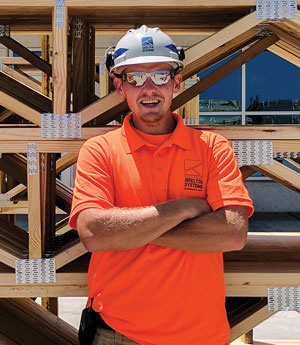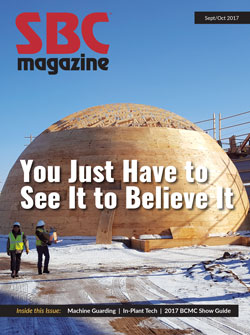Faces of the Industry: Randy Rickels
Faces of the Industry: Randy Rickels
 How did you get into this industry?
How did you get into this industry?
I quit my previous job—I was an arborist for eight years. My friend had a job here and he says, “why don’t you come up in here?” So I put in an application and about a month later I got a phone call. And I was thinking, “This will hold me over until I find what I want to do for a career.”
Just a hold-over job…it sounds like that outlook didn’t last long.
I came in on the night shift, and when I first started the job, I always wanted to see more. I got really interested in what I was doing, and I just wanted to know it all. So I would go home and browse on YouTube for videos of component plants. After a while, I talked with the general manager, Lenny Mills, about moving to the day shift because I was due to have a baby. I thought eventually I’d move back to the night shift, but I just worked hard every day that I came in, and one day Lenny came up to me asked me to shadow the person doing production training. I love to try new things, to take on new tasks and challenges, so I said “I’d love to.”
I had worked all over the plant, so when I started in this, I learned really quickly. There were a few specific things I hadn’t done, so I learned those, too—that way, everybody knew that if they had any questions, they could come to me. Before I stepped into the Lead Trainer, Production position, there were a lot of people taking on multiple tasks. This role consolidated everything—my job is to make it easier for all of them and harder for me (or at least that’s how it seems at times!). That’s the best part, actually; this job keeps me working with other team members, getting feedback, making it easier for them to do their jobs. It keeps you involved in everything that’s going on.
You came to the SBCA meeting in Baltimore last June. What did you get out of that experience?
It’s just good to be with other people in the industry. Everyone throws ideas out there, and if a roomful of people throws out their ideas, one person might be able to take one of those and really work with it—put it into practice and report back. Jason Ward [of California TrusFrame] and I met at the meeting, and we contact each other a lot now to share ideas. The West Coast is totally different from the East Coast! Or take Jared Dix of Apex Truss, for example. When he spoke at the meeting in Baltimore, I heard someone speaking from his heart. Jared loves the industry—he’s young, with a bright future. He’s someone I look forward to continuing to work with in this industry. I see his love for what he does every day on social media. (Find Jared’s Truss Tales project on Facebook, Twitter, Instagram, Youtube and at trusstales.com.)
The best idea I’ve heard in a long time is the Emerging Leaders Committee. I was thinking of trying it in our facility: getting some of the older guys to mentor some of the younger guys. It could give the emerging leaders something to strive for because they want to learn and build off the mentors, and they don’t want to fail. So that would give the guys out there who are being mentored a reason to do better and want to succeed.
What’s so critical about giving younger members of this industry that extra push to succeed?
When Barry Dixon came in [to the Emerging Leaders Committee roundtable discussion at the Baltimore meeting] he just looked around, and he said, “Man, we’re the old guys of the group now!” And I looked around and thought, “Man, I only see three or four younger guys!”
There’s so much to learn about this industry! I always turn around and ask questions of people who’ve been in the industry for 30 years and they say, “You’re just starting to wonder that now?” I’m not one to fail. I try to see what needs to get done. But what we, the younger generation, need is knowledge—the older generation passing knowledge down to the future of the industry. That’s the biggest challenge: getting them to open up. Even outside of work, trying to speak to some people…it’s kind of like a secret that they want to hold back. The new, young generation needs that knowledge to continue the careers that the older generation started!
I think it goes both ways: I think the younger generation needs to slow down and listen to the older generation, but I think the older generation also needs to open up to give us the information. In order to keep production flowing, we need knowledge. Ten years from now, we’re going to need to pass that knowledge down to the next generation. Us young guys, we’re the future of every company.
Here at Shelter, I love seeing young people getting involved. Joe Hikel’s sons, Jason and Ryan, as well as our design manager, Tony Acampa, are all younger folks wanting to grow with the industry. I’m looking forward to
growing with them all as the industry moves forward.
How do you spread that message—your positive outlook and your support of those just establishing themselves in the industry?
I tell everyone: every day you walk in the door, you need to learn something new. Even if you do the same thing you did yesterday, you’ve got to try to learn something new.
And I’ve started going to a local school: the Carroll County Career and Technology Center. Our HR staff had gotten in contact with the carpentry program and was planning to send someone over with a PowerPoint to talk about what we do at Shelter. I said: stop right there. We’re not going to give them a PowerPoint. PowerPoint is outdated and boring. They want to watch something. They want to be hands-on. So I had one of our designers design a valley truss and I cut all the lengths of board that they needed to put it together. The class of 19 students split into two teams, they took the design and went on their way. They asked great questions, and we gave prizes to the team that finished first.
Afterward, the instructor told me, “I will never have another company in here who doesn’t provide a show like you did.” He knows: no more PowerPoints. It’s pretty cool to be involved with the kids. It’s great, because they’re our future. So if I can get them involved and maybe get them over at Shelter, that’s great. That’s really the hardest thing: trying to figure out the future of the industry by understanding the people who are coming through the door.
What do you see as the future of this industry?
I don’t want to say automation! I always tell the guys who say automation is the future that three of our guys at Shelter, without a doubt, could build a truss with the same quality as that automated system, in less time.
Shelter has some young workers out there who really work hard and take pride in their work. It’s good to see those guys come in and work their butts off. Car companies, they use robotics to build a car, but with the wood industry, how would a robot detect a board that might have a crack in it? Or a little bit of wane? Nothing beats human hands working. And everyone has to work—everyone has a family to feed. So I would never want to take away a job from someone who wants to work.
When people think of Shelter Systems, they think of a big business, a big corporation. But we’re family owned and operated, and that’s what kept me around. Dwight Hikel really built this company from the ground up with his own hands. It’s rare to hear the word legacy, but when you think Dwight Hikel, you know that his memory will never go out the window.
Today, Shelter is a home-away-from-home for its employees. The general manager, Lenny Mills, is the most respected man I’ve ever met. He’s such a good guy—he’s kind of like a dad to everyone. You can always go to him with problems. I’m sure we stress him out sometimes, but everybody looks up to him and respects him, and that’s what keeps everyone around. I try, and especially upper management, they try, to make everyone feel like they’re wanted. Right now, we’re at nine-and-a-half-hour days, mandatory, and Saturdays we’re at five hours. So you’ve got to love each other to some extent, because that’s where you are every day.
The people that I work with are my favorite part of this industry. Everyone in the plant is awesome. We’re a big family, we joke around and enjoy our work. Learning, whether it’s something new about the industry in general or something specific to our process here at Shelter, is what I look forward to every day. There’s always so much to learn. Everyone always comes up with new ideas, and thinking about where the future can take us is what makes me strive to keep going.
When you’re not thinking about trusses, what keeps you busy?
Enjoying family time with my fiancée, who has always been there to keep me going. And my three year old. He’s my world. He helps me with projects at home; when I play sports, he’s right by my side, cheering me on. He is the highlight of my life and the definition of true love. Nothing’s ever going to beat that.

